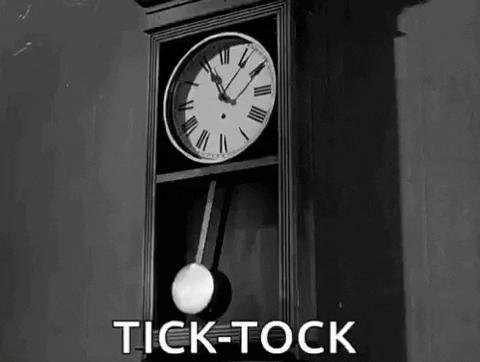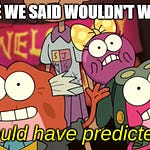Original Music by BlueSunChasing
I attended The Chronicle’s webinar a few weeks ago: “Keep on Teaching: Support and Motivate your Students without Exhausting Yourself,” part one of two (the next session is 2/10 at 2pm EST for newsletter subscribers).
Lots of good stuff there — especially Dr. Bryan Dewsbury’s comments about “content” and the evidence that reducing the content packed into a course improves learning in science courses with no negative impact on future courses — but I want to focus on a specific phenomenon an attendee touched on because I’ve been thinking about it myself in the organizational context.
The faculty member in the Q&A posted that they’re concerned about a level of resentment they’re feeling from students, something different from anything they’ve experienced in the classroom before.
I’ve been thinking about this idea not because I’m experiencing it with students but because of the organizational context. I experience and witness phenomena that are very different these days and hear about it from people across org contexts. I started thinking through them and wondering what that could be about: Overall exhaustion? Adrenal depletion? Moral disengagement? Moral injury? Something else?
Before I read up on it, I was formulating some of the dynamics in my mind: The hostility that emerges when literally every problem of the day can be linked back to prior organizational decisions or larger formative contexts (and those contexts also include a series of decisions). Reaching peak capacity after absorbing the many, many needs left unfilled by those decisions and contexts, especially in educational settings and healthcare where resources have been cut to the bone. The sense of powerlessness. The lack of justice. The sense of being failed.
I was wondering how common those dynamics are in organizations as employers demand, for example, a return to the office for jobs that can be conducted remotely and doing so for reasons that have little to do with actual productivity.
It feels like resentment, and I thought that surely someone must have already named a construct Organizational Resentment. Sure enough, here’s a definition I found:
A significant number of employees have developed powerful, yet largely unexplained attitudes of dislike, disdain, and bitterness toward their employers. . . . I explicate the key role that justice and power plays in the suppression of this unrecognized concept in the field of management. I specifically argue that organizational resentment is a negative attitude that individuals have toward organizations composed of indignant cognitions, emotions, and behaviors.
~Dr. Darryl Rice, 2013
Dislike, disdain, bitterness . . . indignant cognitions, emotions, and behaviors. A relationship with justice and power……yep. I think that covers it.
I wonder if these are the dynamics at play in classrooms, too. After all, students are living through the same formative contexts and experiencing the same resulting phenomena.
They’ve witnessed first-hand both rhetoric and operationalization around who matters here during the global pandemic, and I especially wonder how medically at-risk students operating in purportedly inclusive spaces feel about our libertarian approaches to a highly transmissible virus.
Students undoubtedly see the long-term effects of COVID-19 on the ground, and I’ll spare us the emerging evidence that this virus is way more dangerous than we’ve been led to believe. It sounds like the stuff of conspiracy, really, so I’ll reserve that commentary for now.
(But let’s just point out that this past month, we are watching in real time as the economic elite take the kind of COVID precautions experts have been advocating for while ensuring that the media outlets they own promote just the opposite for the masses because doing so is politically valuable and economically expedient. It sounds like a conspiracy theory, I KNOW. I am deeply familiar with the Illuminati plot line! Time will tell, though.)
And beyond the walls of our organizations, students are watching, witnessing, and experiencing the effects of larger formative contexts and decision-making by people with power: Climate change, the student loan crisis, ongoing privatization of public goods, widening gaps between the wealthy and everyone else. Ongoing and direct threats to their communities. Ongoing violence.
Meanwhile…..today, class, we’re learning about something that is important but not urgent. Something crucial but not critical.
I’d be resentful, too, if I didn’t see how what I’m doing in this moment connects to these broader, deeper, wider phenomena I’m experiencing in my life and witnessing across the globe and projecting into the future. I’d be resentful if I felt like everything was out of my control and that resistance is futile and that, what? I need to learn X? What is the point??
I’d be resentful if I felt that what I’m learning is applicable only to a world that no longer exists.
And if I were feeling this dynamic in my own class or among my own team, I think I’d be heading back to basics as outlined here: Building trust and psychological safety. In the classroom, I’d be linking our work to larger formative contexts and clearly demonstrating how X applies to the world of both today and tomorrow (I do that now, which maybe staves off some of the resentment) and acknowledging the reality of our collective circumstances.
How does learning about X (literally any concept, idea, work of art, technique, etc.) help us better understand Y, a real-life phenomenon or problem? If we are not learning how to solve the problems of today and our anticipated problems of tomorrow, what — exactly — are we doing here?
Does learning about X fit the needs of our new and changed contexts, and if so, how? I’d be making that connection clear.
I’d also build in more opportunities for empowerment because — again — the sense of powerlessness is real amid these complex times.
Empowerment is wrapped up with hope, but not immature hope. Immature hope, to me, is the belief that things will get better without any actual work of making it so. Immature hope is belief that “the arc of the moral universe is long, but it bends toward justice” without acknowledging that it bends due to pressure. Movement toward justice is in no way natural or apolitical.
But I’d be looking real hard at the conditions that support that kind of work, too. Hannah Leffingwell, writing in The Chronicle, notes that
Students today are in the harried hands of underpaid and overworked educators who are unable to offer the attention and support students deserve.
That’s not an individual problem: That’s a problem of formative context, one in which public goods are under systematic deconstruction.
And it worries me in part because do you remember that marriage research by Gottman? The one where researchers put people in a “love lab,” measured their interactions, and predicted divorce with a 90% success rate? That line of research always sticks in my head because one of the central dynamics in the prediction process was contempt.
I worry that resentment is the last stop before contempt, and I don’t know what that means for our organizations, if that’s true.
So let’s pause so that I can say this:
If you or your students are feeling resentful in a way that you’ve never experienced before, yeah. That’s not an unusual reaction to the circumstances in which we find ourselves.
It’s not a problem that can be solved individually, though I do think we can make individual efforts to influence our own spheres of operation. I think finding space for collective action is the right approach, however that looks for people.
And we’ll want to take special care of ourselves and one another. Personally, I think I’m often too hard on myself when I experience a new kind of negativity. Why are you such an @$$, Christine, I wonder to myself. Why do you feel these things? Think these things? This is not you.
But those thoughts and feelings are just data, rational responses to highly irrational circumstances: The data paint a picture and tell a story. Let’s go easy on ourselves, even when we might not like what we’re seeing. It’s just a research puzzle, and we can be at peace with our data while we figure it out.
I think one pathway to figuring it out is the same old-same old (for me, anyway): It’s care. I have a lot more to say about the contexts of care (some of it is back here in this post with more here), but here’s a some actionable stuff from CCRC. Some of it will be old hat for readers of this space, but maybe some of it will help people working through some things.
CCRC’s Caring Campus initiative includes specific behavioral commitments that can help build a sense of belonging for students, help them navigate the complexities of the college of environment, and — though not stated here — nurture our own humanity and connection. Here are the broad strokes; they provide more operational advice in the link above:
Learn and regularly use students’ names
Communicate clearly about the course
Create moments that matter
Provide frequent assignments and assessments
Practice situational fairness
There’s advice here for the organization, too, especially if we’re considering creating more caring ecosystems. That kind of work requires investment and strategy: Did you know, for example, that a group is working under a $150,000 grant to explore “Pedagogies, Communities, and Practices of Care in the Academy After COVID-19”? Under PI Dr. Cate Denial at Knox College, the 36 participants from across higher education are creating a framework for what care actually looks like in higher education.
That’s the kind of investment it takes to make that happen, but in the meantime, I think we have some small and incremental movement in the right direction. Let’s just temper our expectations for now: We won’t transform our environments overnight, and without strategy, we have little hope of transforming over the long term. But the work going on in that grant gives me some hope.
So for now, that’s all I got.
In the meantime, consider dropping into part two of that Chronicle webinar.













Resentment?